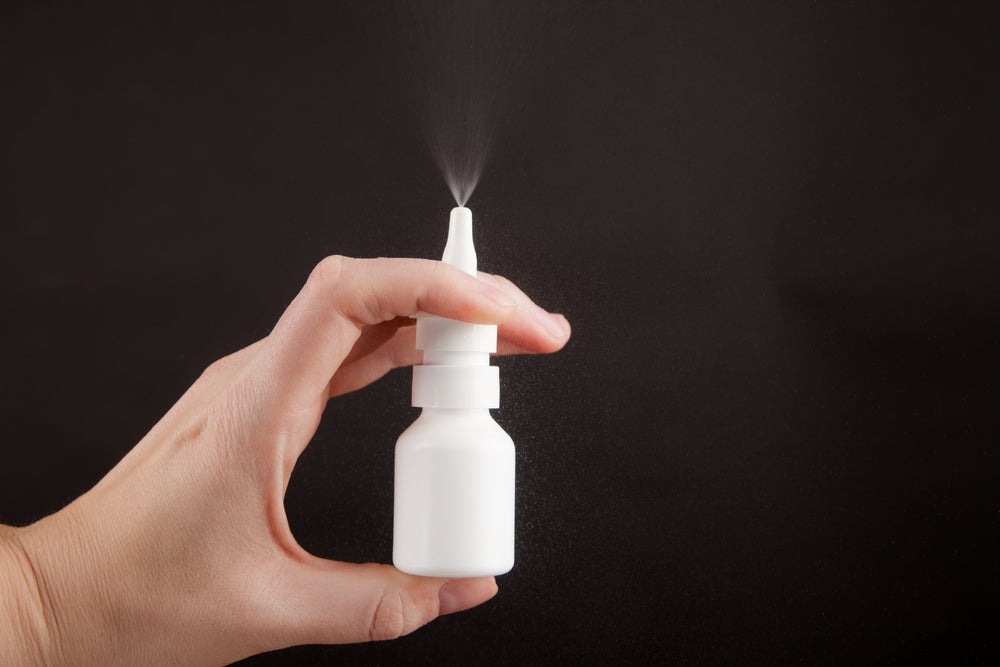
Understanding Nasal Sprays in COVID-19 Defense
Since the outbreak of Covid-19 worldwide, scientists and pharmaceutical companies alike have raced to find ways to protect against and treat the virus. One method of administration increasingly being pursued is the nasal spray; the cells lining the nose have been identified as a key entry point for the novel coronavirus, and a spray mechanism could circumvent the obstacles associated with other forms of treatment, such as injection or oral routes.
Pharmaceutical Technology takes a look at some of the Covid-19 nasal sprays currently in development.

Discover B2B Marketing That Performs
Combine business intelligence and editorial excellence to reach engaged professionals across 36 leading media platforms.
COVIXYL-V (Salvacion USA)
New Jersey-based medical devices company Salvacion, in partnership with the National Cancer Institute, is developing a nasal spray technology to prevent Covid-19 infection. The spray, COVIXYL-V, contains the active ingredient ethyl lauroyl arginate hydrochloride (ELAH) and creates a physical barrier that prevents the virus from attaching itself to the surface in the nasopharynx.
An in vitro study of COVIXYL-V with an rVSV-SARS-CoV-2 model showed the virus is 99.99% inhibited at low concentration. An in vivo study in Syrian hamsters also demonstrated that the virus is 99.99% inactivated with no adverse events following administration of the spray.
Salvacion has submitted COVIXYL-V to the FDA for pre-emergency use authorisation and is awaiting approval for the product’s commercial use in the US.
Nasitrol (Amcyte Pharma)
Nasitrol, an algae-derived nasal spray developed by Argentinian company Laboratorio Pablo Cassara, has been approved in Argentina for the prevention of the common cold for a decade. Now, the product is showing promise to prevent the transmission of Covid-19.

US Tariffs are shifting - will you react or anticipate?
Don’t let policy changes catch you off guard. Stay proactive with real-time data and expert analysis.
By GlobalDataA recent study, conducted at eight hospital intensive care units (ICUs), administered either Nasitrol or placebo to a sample of 394 clinically healthy physicians, nurses and other medical professionals who provided care to coronavirus patients and who had not yet been vaccinated against the disease.
The incidence of Covid-19 infection was significantly lower in the Nasitrol group compared with placebo, at 1% versus 5%. There were no differences in the incidence of adverse events between the two groups.
Nasitrol will be marketed by Amcyte in the US through a licensing agreement with Laboratorio Pablo Cassara.
IGM-6268 (IGM Biosciences)
IGM-6268 is an intranasally-administered immunoglobulin M (IgM) antibody treatment candidate for the treatment and prevention of Covid-19.
In preclinical studies, IGM-6268 demonstrated significantly greater neutralisation of SARS-CoV-2 with an IgM antibody compared to immunoglobulin G antibodies, the potent neutralisation of all evaluated mutant variants of concern and variants of interest, and the ability to provide effective preventative and therapeutic protection when delivered intranasally in mice.
American clinical-stage biotech IGM Biosciences has exclusively licensed the rights to the antibodies used to generate IGM-6268 and related intellectual property from the University of Texas System.
Carragelose (Marinomed Biotech)
Marinomed Biotech’s red seaweed-derived Carragelose is a broadly active antiviral compound for treating respiratory diseases, approved in the EU, Australia and parts of Asia in the form of nasal sprays, throat sprays and lozenges.
Carragelose coats the mucosal tissues of the respiratory tract, forming a physical barrier that helps to protect against viral infection.
According to a trial conducted by an Argentinian research group, a Carragelose-based nasal spray showed significant efficacy in the prevention of Covid-19 among hospital staff managing patients with the virus.
The percentage of participants that developed Covid-19 was significantly lower in the group that received the iota-carrageenan spray compared to placebo – 1% and 5.1%, respectively.
Enovid (SaNOtize)
Canadian biotech SaNOtize’s nitric oxide nasal spray Enovid became available in pharmacies in Israel earlier this month as a treatment for Covid-19.
The spray received emergency use authorisation in Israel in early July after Phase II trials showed it reduces SARS-CoV-2 viral load, and therefore decrease a person’s transmission of the virus.
Releasing a small dose of nitric oxide, a natural nanomolecule with anti-microbial properties including against SARS-CoV-2, Enovid provides a physical and chemical barrier in the nose.
In June, SaNOtize announced it had received approval from Health Canada to proceed with enrolment of volunteers in Phase III trials, and submitted an application for a New Drug Submission under Health Canada’s Interim Order.
The company is in the process of regulatory submissions in several other countries, including India, Brazil and Mexico.




